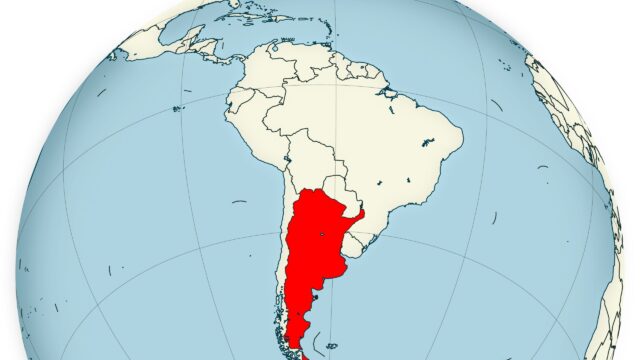Why Argentina May Be the Jewish Diaspora’s Next Frontier

Argentina’s election of Javier Milei in December 2023 has provided international Jewry with an intriguing opportunity.
To say that Milei’s administration is pro-Zionist would be an understatement. Apart from his promises to make the Argentine economy attractive to international finance, Milei has gone out of his way to kowtow to Jewish interests — from honoring the Bibas family with a national mourning period and altering the name of a Buenos Aires street, to designating Hamas a terrorist organization and vowing to relocate the Argentine embassy to Jerusalem. The lengths he’s going to advance Jewish interests make one wonder if he belongs in the Israeli Knesset as opposed to Casa Rosada.
Or perhaps there’s something much bigger at play. Despite having a sovereign state for the first time in two thousand years, it remains widely acknowledged that Jewish history is marked by repeated expulsions from numerous countries around the world. Statecraft has rarely been a historical strength for Jews, and the so-called curse of the eighth decade serves as a stark reminder of the deep instability that often plagues Jewish states.
Relentless attacks from Hamas, Hezbollah rockets in the north, and Iranian missile strikes on cities like Haifa and Tel Aviv—paired with growing internal rifts between secular and religious Jews and the burden of a welfare-dependent ultra-Orthodox population—are fueling doubts about Israel’s long-term viability as a functional state. In light of these alarming trends, a long-term exit plan may be in order.
Enter Plan Andinia.
Milei’s moves to secure Argentina as a refuge for global Jewry have reignited claims that a broader Zionist plan exists to colonize Argentine and Chilean Patagonia.
The theory was put forward by members of Frente Nacional Socialista Argentino (the Argentine National Socialist Front) in the mid-1960s and later disseminated by Chilean diplomat and esoteric Hitlerist Miguel Serrano. The former Chilean diplomat contended that for over twenty years, Jews disguised as backpackers and poor hikers have been traveling through the most remote and strategic regions of southern Chile with the support of Chilean authorities, the army, the navy, and the National Forest Corporation (CONAF), fully aware that they actually belong to the Israeli military, air force, or intelligence services.
In fact, Radio Universidad de Chile reported that a significant number of Israelis travel through South America, often right after completing their compulsory military service. Patagonia has emerged as one of their preferred destinations. Notably, in late December 2011, Israeli tourist Rotem Singer accidentally sparked a major wildfire in Chile’s Torres del Paine National Park, which ended up consuming more than 17,000 hectares of pristine terrain.
Chilean authorities detained Singer, who ended up negotiating a deal to pay approximately $10,000 in restitution to CONAF before leaving the country. The leniency of the resolution sparked public outrage in Chile, where many had anticipated a prison sentence for Singer. Demonstrators gathered in front of the Chilean Supreme Court to voice their anger with the court’s decision to ratify the sentence.
In a 2017 interview, CONAF’s director of the Magallanes region revealed that Israeli tourists were responsible for nearly two-thirds of all expulsions from Torres del Paine over a five-year period. This troubling pattern led many local hostel owners to adopt informal policies of refusing service to Israeli nationals.
Curiously, the Jewish diaspora has built solid roots in Argentina for well over a century. Jewish migration to Argentina goes back to the late 19th century, when the Argentine government pursued an aggressive policy of mass migration to populate its vast, underdeveloped territories. From 1850 to 1913, Argentina welcomed 6.2 million migrants from Europe — largely coming from France, Germany, Italy, and Spain.
European Jews, fleeing ethnic conflict in Russia and Eastern Europe, were among those who arrived in Argentina. Between 1889 and the early 20th century, thousands of Jewish immigrants arrived, establishing agricultural colonies in provinces such as Entre Ríos and Santa Fe. The most famous of these, Moises Ville, became known as the “Jerusalem of Argentina” and was supported by the Jewish Colonization Association, founded by the Jewish philanthropist Baron Maurice de Hirsch.
These settlements were intended to function as autonomous communities. The concept of Jewish settlements outside of Palestine was seriously considered by several early Zionists. Theodor Herzl, in his foundational work Der Judenstaat (The Jewish State), listed Argentina as a potential site for Jewish settlement, alongside Palestine. Herzl noted Argentina’s vast, fertile lands and sparse population as advantages, but his vision was for local autonomy rather than an independent Jewish state. This idea of a Jewish homeland outside Palestine eventually led to the schism of the Jewish Territorialist Organization, which sought to establish Jewish autonomy anywhere in the world, but these plans never materialized.
Nevertheless, Jewish migration continued trickling into Argentina. At its peak, the Jewish Colonization Association owned over 600,000 hectares of land, and by 1920, more than 150,000 Jews lived in Argentina. The country’s sparsely populated territories and its tradition of religious tolerance made it an attractive destination for Jews in the Old World who wore out their welcome in the Russian Empire. With around 250,000 Jews, Argentina currently has the largest Jewish community in Latin America and the fifth largest outside of Israel.
Now that Milei is transforming Argentina into one of the most pro-Jewish countries in the world, it may emerge as a refuge for Jews. As instability clouds Israel’s future, Argentina’s calmer geopolitical environment and vast, untroubled landscape could make it an appealing fallback if the Zionist project falters.
In a world where Israel’s permanence is no longer guaranteed, Argentina is quietly positioning itself as a Plan B.
